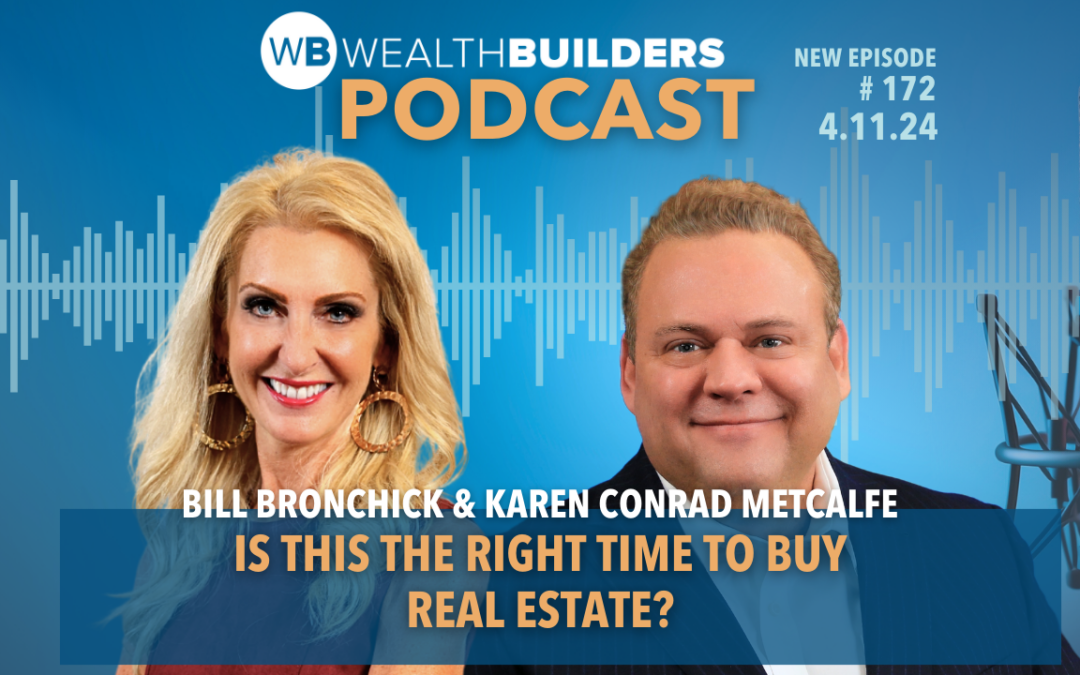Is This The Right Time to Buy Real Estate?
The answer is, “It depends!”
Depends on what, you ask? In this episode of The WealthBuilders Podcast, host Karen Conrad Metcalfe meets with attorney Bill Bronchick to discuss just that. You will learn about the significance of supply and demand dynamics and evaluating properties on a local level.
In addition, Karen and Bill touch on interest rates and how to invest in real estate based on your specific goals. With practical advice and recommended metrics, the podcast equips both novice and seasoned investors with the knowledge needed to make informed decisions and seize opportunities in real estate. To watch this week’s episode, click the video player below or listen on your preferred podcast platform.
Is This The Right Time to Buy Real Estate?
It depends.
- Technically, there is no bad time to invest in real estate thanks to the concept of dollar cost averaging. Values go up and down in the short term, but in the long run, they will always go up.
- Instead, it’s more important to look at each neighborhood and property on a granular level.
Supply and Demand
- In 2019, myself and many others thought the stretch of real estate appreciation was over. Then, in 2020 just the opposite happened. Interest rates dropped, demand skyrocketed, and supply drastically decreased. A year after that, interest rates climbed to 3.5 – 7.5%, which reduced demand.
- When it comes to investing in real estate, everything comes down to supply and demand. When supply is low and demand is high, prices go up. The opposite is true, too. When interest rates went up, demand went down because people didn’t want a payment at high rates.
- What happened recently: demand AND supply dropped. People didn’t want to buy because of high interest rates, and sellers didn’t want to sell because they wanted to hold onto their low interest rates.
- Affordability is not the metric to look at. It is supply and demand within each neighborhood.
- Starter homes are in low supply because builders don’t make a profit on 1200-1500 square foot properties. They have to build at least 3500 square foot homes to break even.
- On the other hand, 1 million dollar + homes come with a much higher mortgage payment (you can’t rent them out for a good investment), but you can get a better discount on them and negotiate to get more for your money.
- If you’re on the fence about buying or renting your home, it really is a toss up in today’s market. People love to say, “I don’t want to throw away my money on rent,” but in the first 5 years of owning a home, you’re virtually spending all of your payment on interest anyway. It takes years to start really chipping away at the principle. Plus, there are taxes, maintenance, and insurance.
A “Good” Market is Dependent on Your Goals
- Is your goal cash flow now, equity later, or a combination of the two? If it’s cash flow, you’ll want to buy in markets—probably in the south or midwest— where you can rent out the property for far more than your monthly payment. If it is equity, you can afford to buy in “hotter” markets and make bigger money when you sell.
- Whether the market is up, down, or sideways, there are always people with particular problems. They are people who are going through foreclosures, job losses, foreclosures, and you can help them through a real estate deal.
- Related: How to Strategically Select an Investment Property
Interest Rates
- The Fed Rate is not directly related to mortgage rates. Mortgage rates follow 30-year long term bond yields. Usually, they are on a similar trajectory.
- Interest rates could change depending on how the election year goes. Speculating, if Trump is elected, rates could drop, and if Biden is reelected, they could continue to rise.
Advice for someone going into real estate:
- Find a deal somewhere. Like they say in baseball, base hits will win you the game. Find a reasonably good, lower-middle income property built in the 1950s or later. They are easier to cash flow and sell profitably. On the other hand, higher-income homes are the first to dip when the market goes south and the last to rise in value.
- Pay attention to state property tax rates when you purchase properties as well, and factor those numbers into their profitability.
Here are the metrics we recommend following when buying real estate:
– 1% return of the purchase price in monthly rent
– $300+ a month cash flow
– Housing prices are no more than 2-4x the median household income in the area
– 10-20% ROI / cash-on-cash return



